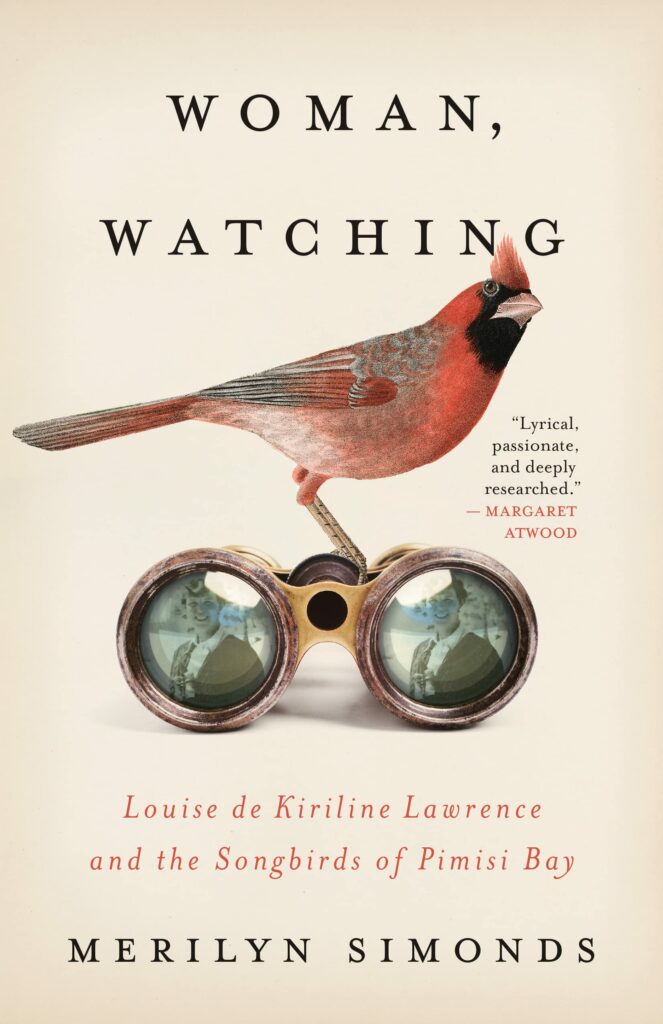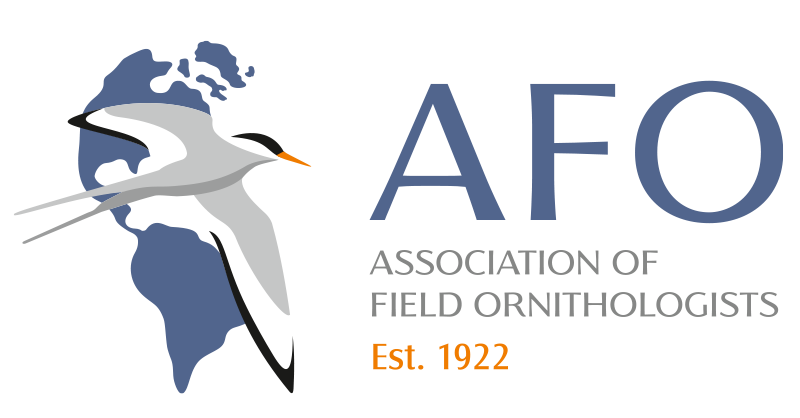Woman, Watching: Louise de Kiriline Lawrence and the Songbirds of Pimisi Bay. Merilyn Simonds. 2022. ECW Press, Toronto, ON, CA. 416 pages. ISBN 9781770416598. Paperback ($29.95 CAD).

In Woman, Watching Merilyn Simonds shares the true story of Louise de Kiriline Lawrence, a self-taught ornithologist who spent decades of her life studying the wild birds that she shared her northern Ontario home with. At first glance, prospective readers might think Woman, Watching is a book solely for bird enthusiasts. How wrong they’d be.
Through extensive research, Marilyn Simonds writes a compelling biography, using accounts from Louise herself, sourced in her publications, and the extensive personal letters to her mother in Sweden and various friends, who fortunately saved them.
After a short introduction we’re plunged into Louise’s well-off childhood in Sweden. Immediately we spot the familiar traits of a budding naturalist. Louise is encouraged by her parents to explore the forests and natural areas around their home. She’s notes the arrival times of different birds in the spring, and enjoys a bird feeder placed just outside the window. Through her father, Louise is introduced to a rotating cast of notable conservationists, no doubt also helping to shape her early interests.
The story pivots when Louise hits her late teens. During the wartime era in Europe, Louise trained to become a nurse and found work with the Red Cross at a prisoner-of war-camp. Soon after, a romance blossomed between Louise and a Russian POW, Gleb Nikolayevich Kirilin. At this stage in the story we’re plunged into an adventurous tale of two lovers from opposing nations, and the great lengths they had to go through to be together. It’s a remarkable story, and I won’t dare share any spoilers here.
In her thirties, Louise finds herself in Canada. Her scientific mind is put to work as a nurse with the famous Dionne Quintuplets. The account of her time working with the family will be fascinating to those both familiar and unfamiliar with the story of the Quints, as she navigates health concerns, family drama, and the intense politics that surrounded the children. Everyone close to the children received a great level of attention from the media, and Louise was no exception. However, she loathed the media circus, and instead turned her to attention to writing a scientific, yet passionate book about how to raise infants through their first year. The book received great publicity, yet hardly a copy was sold as it couldn’t compete with the sensationalized content that the public thirsted for.
Upon resigning from her very public role as a nurse for the Quints, Louise delved into raising hens and selling eggs, again, using a heavily scientific approach to excel at this work. She appears to thrive where she has made her home, on a forested property in northern Ontario; embracing all the good and bad that comes with living in rural Canada in the 1930s.
One day, while enjoying some solitude, Louise notes a black and white bird with a bright orange belly, which she refers to as “Jelly-belly”. In my opinion, a far better name than Baltimore Oriole. She can’t settle with not knowing the actual name of the bird, and this sparks a new obsession.
Throughout the rest of the book, Louise becomes a highly skilled self-taught ornithologist, or as we might call her today, a ‘citizen scientist’. The journey from Jelly-belly observer to the first Canadian woman elected to the American Ornithologists Union, is rich with accounts of the bird life she studied near her forested home. I enjoyed reading about her earliest bird observations, and seeing her theories and methodologies grow and improve over time. We learn about her experience banding birds, innovative ways of tracking and observing nesting pairs, and the very simple but perhaps underutilized method of being patient. So many of her key findings came from years of slow and patient study of the bird species that are often thought of as more common. I found those observations fascinating and relatable. It’s always enjoyable to learn more about species that I too can see, simply by walking into a wooded area.
Readers familiar with the history of the early study of birds, will revel in the encounters and friendships she made with world-renowned ornithologists. Her North Bay home was bustling at times with visits from other birders and naturalists. I can picture the conversations well, the sense of community, the laughter, and the way eyes would have lit up as stories were swapped and shared.
The extent of Louise’s career is impressive, and I can’t possibly touch on all of her achievements here. She published books, contributed scientific specimens to the Royal Ontario Museum, and wrote many articles on her findings. Getting published was not an easy task, and her perseverance in that area is a fascinating read. I also found her challenges navigating a male dominated field, especially as a self- taught researcher, to be really inspiring. Additionally, she struggled with something that many readers can likely relate to; the knowledge of declining bird populations. Louise noted worrying trends throughout her decades of study in her local patch, and it is very clear that those findings weighed heavily. Woman, Watching is a well-paced account of a very fascinating life. The ongoing theme is of what can be accomplished when a curious mind takes to a task with determination and grit. This theme is what makes the book so digestible for a wider audience. You do not need to be a scientist or a birder to enjoy the story of Louise’s life. It’s an adventurous tale about a woman with a never-ending love for the natural world.
Andrea Gress
Special Projects and Ontario Piping Plover Program Coordinator
Host of the Warblers Podcast
Birds Canada
Header photo: Niagara River, Brett Billings/USFWS
Suggested citation:
Gress, A. 2023. Review of the book Woman, Watching: Louise de Kirline Lawrence and the Songbirds of Pimisi Bay by Merilyn Simonds. Association of Field Ornithologists Book Review. https://afonet.org/2023/05/woman-watching/.
If you are interested in contributing a book review, or if there is a book you would like to see reviewed on our site, you can contact our Book Review Editor, Evan Jackson at evan.jackson@maine.edu
